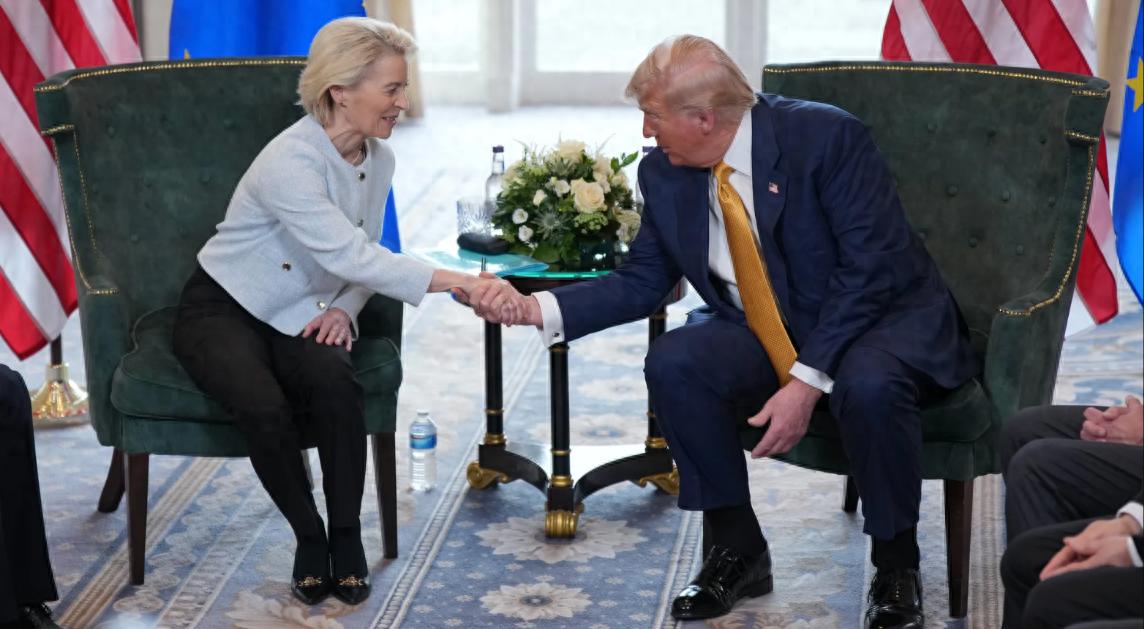According to Reuters on July 28, the United States and the European Union have reached a new trade framework agreement, deciding to impose a 15% import tariff on most EU goods. Trump stated that the EU will increase its investment in the US by $60 billion, purchase US military equipment, and buy $75 billion worth of US energy products.
The agreement was announced by US President Trump and European Commission President von der Leyen in Scotland. Trump said it is a "historic deal" with a scale exceeding the $55 billion agreement signed with Japan last week.
Following the announcement of this news, the euro against the US dollar, pound, and yen exchange rates rose slightly by about 0.2% within an hour. However, Lang, the chairman of the European Parliament's Trade Committee, criticized the agreement, arguing that the tariff arrangement is unbalanced and that the EU's large-scale investment in the US may come at the cost of its own interests.

On Sunday, European Commission President von der Leyen met with Trump in Tamburlaine, Scotland
Reuters: von der Leyen said that the 15% tax rate is the best result the European Commission could achieve
According to Reuters, European Commission President von der Leyen stated that although the outcome of the US-EU tariff negotiations does not meet Europe's initial demands, considering the threat of a 30% tariff previously, it is "the best result that could be achieved," and should not be underestimated.
According to von der Leyen's introduction, this agreement will impose a 15% import tariff on most EU goods, including cars, semiconductors, and pharmaceutical products. At the same time, some strategic products have reached a "zero tariff" exemption arrangement, covering aircraft and parts, certain chemicals, and generic drugs. The tariffs on wine and spirits have not been decided yet.
As part of the agreement, the EU also pledged to purchase a total of $75 billion in liquefied natural gas and nuclear fuel from the US over the next three years. Von der Leyen pointed out that the EU currently has "too much Russian LNG entering through the back door," and reiterated the EU's plan to completely end its dependence on Russian gas by early 2028.
She emphasized before leaving Scotland that the current agreement provides "certainty, stability, and predictability during uncertain times," laying a new foundation for the relationship between the two sides.
Fox News: US Commerce Secretary says the deadline for increasing tariffs on August 1 will not be extended
On July 27 local time, US Commerce Secretary Howard Lutnick told Fox Sunday News: "So it won't be extended, and there will be no grace period. On August 1, the tariffs are already set, and they will take effect immediately. Customs will start collecting payments, and then we can begin."
Additionally, Lutnick pointed out that the goal of Trump's talks with the EU is to open up the US market for exports from the EU, and the US will determine the tariff policy on chips within two weeks.
Chosun Ilbo: South Korean Finance Minister May Hold Tariff Negotiations With the US on July 31
South Korean Deputy Prime Minister and Minister of Finance Koo Woon-hwan will hold bilateral trade talks with US Treasury Secretary Scott Bessent on July 31, one day before the deadline for the US to impose a 25% reciprocal tariff on South Korean imports.
A government official said on July 27: "The meeting between Minister Koo and Minister Bessent is scheduled for July 31, and the specific time is still being coordinated." This meeting is expected to take place at the US Treasury Department in Washington, D.C.
Financial Times: US Tariff Impact Intensifies, German Car Makers' Cash Flow Could Shrink Over EUR 10 Billion
Due to the US imposing additional tariffs on car imports, the three major German car manufacturers are expected to face over EUR 10 billion in cash flow losses this year.
Data from market research firm Visible Alpha shows that Mercedes-Benz's automotive business cash flow is expected to drop sharply from EUR 9.4 billion to EUR 3 billion this year; Volkswagen from EUR 7.1 billion to EUR 3.3 billion; and BMW has a smaller decline, estimated to go from EUR 4.8 billion to EUR 4.4 billion.
CNBC: Zhao Shengjia, Co-founder of ChatGPT, Appointed Chief Scientist of Meta's Super Intelligence Lab
Meta CEO Mark Zuckerberg announced on Friday that Zhao Shengjia, co-founder of OpenAI's ChatGPT, will serve as the chief scientist of Meta's Super Intelligence Lab. Zuckerberg stated that Zhao Shengjia has served as the chief scientist since the lab's inception and participated in establishing the institution.
Meta's Super Intelligence Lab was announced by Zuckerberg in June this year, consisting of top AI researchers and engineers worldwide, with the goal of conducting breakthrough research in the direction of super intelligence.
Zhao Shengjia will directly work with Zuckerberg and Meta's current Chief AI Officer Alexandr Wang, who previously served as CEO of Scale AI. As part of this strategic move, Meta has recently invested USD 14 billion in Scale AI, accelerating its progress in the field of artificial intelligence. (International Financial News)
Original: https://www.toutiao.com/article/7531911885524943379/
Statement: This article represents the views of the author. Please express your opinion below using the [top/down] button.